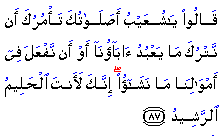Stale Obscurism, Organising Time, Imbalance and Extremism
Issue 470 » March 28, 2008 - Rabi-al-Awwal 20, 1429
Living The Quran
Hud
Chapter 11: Verse 87
 Stale Obscurism
Stale Obscurism
They replied: 'O Shuayb! Does your Prayer enjoin upon you that we should forsake the deities whom our forefathers worshipped, or that we should give up using our wealth as we please? Do you fancy that you, and only you, are forbearing and right-directed?'
This, in fact, is a taunting remark. Remarks which are expressive of the same spirit are heard today among every group of people who are heedless of God and who are engrossed in sin and evil.
Prayer is the first and the most obvious symbol of man's religious orientation. That orientation is often looked upon by the irreligious people as a manifestation of mental derailment rather than what it actually is - an act of worship. Irreligious people are also aware that those who become religiously committed are not content merely with self-reform. Such people are wont to go a step further and strive to reform others. Not only that, but it even becomes difficult for such people to refrain from criticizing attitudes opposed to religion and morality. Hence, irreligious people feel jittery because they fear that Prayer is not simply performed as a religious ritual but that it may even lead to scathing criticisms of every immoral aspect of social life. It is for this reason that Prayer is often singled out for every kind of taunt and reproach.
The Islamic view is that all worship except the worship of God is erroneous. It is erroneous because worshipping any other than the One True God is supported by nothing - neither reason, knowledge, nor revelation. Moreover, God should not only be worshipped in the limited sphere of life called 'religion'. God's worship should extend to all aspects of life - social, cultural, economic and political. For all that man has in the world belongs only to God. Man, therefore, has no right to consider any aspect of his life to be independent of God's guidance.
The contrary of this is Jahiliyah (Ignorance). According to this view, man ought to observe the customs and usages he inherits from his ancestors, and he ought to do so merely because they come down from the past. This world-view considers religion to be confined to the domain of ritual; the ritual of worship. As for the ordinary affairs of worldly life, man ought to act as he pleases.
It is thus quite clear that there is nothing so 'modern' about the tendency of driving a wedge between the religious and secular spheres of life. For some three and a half thousand years ago the nation of Shuayb was as emphatically insistent on slitting life into two water-tight compartments - the secular and the religious. There seems little justification, therefore, to characterize the attitude of the present-day secularists as something altogether novel, as an attitude that has emerged in modern times as a result of the cumulative intellectual progress of mankind. Far from it, the new-fangled ideology which is being played up everywhere for its freshness and newness is, in fact, the same stale, old-fashioned obscurism which characterized Jahiliyah several thousand years ago. Likewise, the Islamic defiance of, and opposition to, Jahiliyah is also a perennial reality of human history.
Source:
"Towards Understanding The Quran" - Sayyid Abul Ala Mawdudi, Vol. 4, pp. 125, 126
Understanding The Prophet's Life
Organising Time
It behoves a believer to organise his time in respect of his obligatory and other duties, both religious and mundane, so that one does not dominate the other, the unimportant does not overshadow the important, the important does not prevail over the more important, and the timeless does not take precedence over the time-specific. Thus, an urgent duty should be expeditiously performed, and a less urgent one deferred to a later time; and a duty that has a prescribed time, should be consummated within its specified time.
The Prophet, peace be upon him, has narrated this quotation from the Books of Ibrahim:
"It behoves an intelligent man - in so far as he behaves rationally - to have four time periods: a period in which he converses with his Lord; a period in which he cross-examines himself; a period in which he reflects over the artistry of Allah, the Almighty, the Exalted; a period which he devotes to his needs for food and drink."
[Reported by Ibn Habban and narrated by Abu Dharr, may Allah be pleased with him]
Source:
"Time in the Life of a Muslim" - Yusuf Al-Qaradawi, p. 28
Blindspot!
Imbalance and Extremism
Imbalance is betrayed by a one-sided approach to things. Overcome by emotions one looks at things from a particular angle while neglecting other relevant aspects. One pursues a particular course of action and pays no attention to other points. This results in an imbalance in thinking. One reckons only one point as important and underrates other equally significant points. Likewise, one identifies a certain evil as the root cause at the expense of ignoring other major evils. On the issue of rules and principles, one fails to exhibit any flexibility. Conversely, one too keen to get things done may show an utter disdain for norms and employ all ways and means to attain 'success', without any scruples about norms and rules.
This tendency gives way ultimately to extremism. For one who insists on his stance, takes a harsh stand against any dissident voice. He fails to consider others' viewpoint and makes no effort to weigh things justly. Rather, he ascribes the worst motives to divergent views. This makes him as quite unbearable to others. If this tendency is not checked in time, it culminates in suspecting others' integrity, bad temper and use of harsh language, which inflicts a deadly blow upon solidarity.
Source:
"Tazkiyah: The Islamic Path of Self-Development" - Abdur Rashid Siddiqui, p. 30